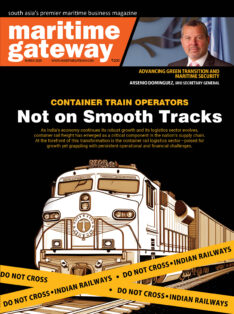An all-inclusive Bill of Lading will negatively impact the tax revenues to the government, make transparent the contracted rates of shippers and complicate the compliance to Incoterms
Let me begin with the hot topic of the day which everybody has been discussing now – the Merchant Shipping Bill 2020, which government is introducing with Shipping Ministry, which involves import and export wherein any carrier shall specify the all-inclusive freight in the bill of lading or any other transport document. No service provider or agent shall levy any freight charges other than the all-inclusive freight specified. So, this seems to be very very straightforward and hard hitting. So, can you walk me through what is this bill about and how does it affect the transactions, the operations per se?
First of all, let me say that we as lines are always in favour of anything that’s progressive. We are always there to help the trade and whatever can be done that’s positive for the trade is always welcome. But to understand this a little more in detail, we will have to go back into the past. During the earlier days, the break-bulk days, it was very straightforward.
It was the ocean freight that the lines were charging the shippers or the consignees, and the consignees took care of all the other costs, all the land side costs were in account of the consignee. Over a period of time, as containerization came in the port authorities as well as the other agencies started billing the lines for landside costs. Obviously when the costs increase, they have to be included somewhere so they were obviously included into the freight, and that’s the time when the shippers and the consignees requested the lines that for the sake of transparency, it would be nice if we had the ocean freight separately mentioned and the charges separately highlighted so that we know how much is the ocean freight and what are the landside charges that are being charged. It is thus, this whole scenario started of having ocean freight separate and the landside charges separate.
Today, what the Merchant Shipping Bill says is that please include all these charges into the freight and have one all-inclusive freight, which is fine. If we have an all-inclusive freight from the shipping lines, we will always be flexible but from the trade angle, they will in fact lose out as far as transparency is concerned because that was the whole idea. Initially, this thing came about only for the sake of transparency and now if we go back to the old times, we are going back one full circle but still going back to the old times where transparency according to the trade was an issue. So, what are we gaining? I think we are only going back in time. I mean, that’s the crux of the whole thing.
Can you elaborate a bit on why do we lose transparency when there is an all-inclusive bill of lading?
Because an all-inclusive bill of lading will have so many other factors involved in it. First of all, the shippers themselves will probably not be aware of what are the charges, how much is the ocean freight and also let me go step by step if you permit me; I might take on some of the other points also but they are all in a logical order so I would like to put them across properly. First and foremost, let’s look at it from the government standpoint. The government, by itself stands to lose about Rs.3,424 crores annually in terms of GST as a result of that.
Why does that happen? Today, there is no GST on the export freight. Import freight attracts 5% GST. Charges such as THC, inland haulage, documentation charges attract 18% GST, which is straightaway income for the government. So, if all this is included in the freight, first of all, the government stands to lose Rs.3,424 crores annually in terms of GST. The second factor is the consignees or shippers might not be very comfortable with their contracted rates being mentioned on the bill of lading, because the bill of lading or the shipping documents move through multiple hands, and there could always be a possibility that their contracted rates could be leaked out to their competitors which they might obviously not want to happen. This becomes even more sensitive in the case of foreign buyers or sellers who control the freight, because they would obviously feel pretty threatened as far as their own business is concerned. And this would happen in the case of 40% of Indian exports and 80% of Indian imports. So, there is a significant chunk of business that will be at stake as far as India is concerned.
Another point is that as far as consolidation of the freight is concerned, this could also probably lead to non-compliance of the Incoterms because when the whole thing is included in the freight, everything gets very mixed up. So, compliance to the incoterms becomes more difficult.
Also, you have incidental charges – certain charges which are incidental like container detention charges, repair charges which might happen or might not happen. So, at the time of shipment, how does one know that this event is actually going to take place. So, how do you include it in the bill of lading? But if the trade wishes and if the shippers or the consignees do not have any objection with the charges ( I am talking about the charges only right now) being mentioned on the bill of lading, then the shipping lines could possibly consider or look at ways and means if these could be included in the bill of lading, but as far as freight rates are concerned, I don’t think it will be right to bring them under the purview of the Merchant Shipping Act as these would interfere with the commercial terms between the shipper or the consignee and the shipping line. So, that in brief is the whole matter.
So, am I right if I understand that there are a lot of variable factors in pricing part that is why it is difficult for the service providers to make it all-inclusive, is that right?
Yes absolutely, the pricing part of it is one thing. The other factor that I explained is from the shippers own angle or consignee’s own angle. They might feel uncomfortable and the incoterms, how do you comply with the incoterms? The government will stand to lose if you mention the rates on the bill of lading. Further the pricing rates would be open to the competitors which the shippers might not want. So, there’s always a threat to some of the people in the business. So, I think it is more detrimental to business rather than helpful.
So, what was the initial reaction? Was anybody, any association consulted before these being drafted? Do you think government fully understands the scenario?
I think the government means well. Obviously, the intentions are good. Perhaps they have not really understood the implications of it, and that’s why, they have come out with a draft bill. But to give them the dues, they are not going after the implementation right now. They have asked several trade bodies to revert with their feedback and CSLA also will be reverting with our own feedback. But this is an issue which along with some other issues we will be highlighting for the benefit of the trade and the government.
Is it not strange that on one hand, government wants to get away with the rates structures at major ports through another bill, and when it comes to the freight rates, they are controlled?
Yes, you have hit the nail on the head Mr. Ram Prasad. Very very valid point. In fact, this is very ironic that is happening here. Just as two contrasting things that are happening which we are also very surprised. It is happening at a time when on one hand you are deregulating the port charges on the other hand, you want to regulate shipping freight which actually is a contractual term between two parties.
Freight rates have been going up phenomenally in the last few months. So, there is furor from the exporters that freight rates are astronomically high and then something needs to be regulated. So, this regulation on freight rates is coming out often and often about. Why is it so and what CSLA is doing to actually put things across the table and trying to reason out with the happenings?
All these years, the Indian imports have always been more than the exports. We always had more equipment coming in and lesser equipment going out, so equipment was never a challenge – it was always available. As a result the freight rates also, over the years, consistently kept going down. Obviously, market forces played their role and no one complained. It’s only in the last 4 months that the freight rates have started going up and suddenly everybody is complaining. Why did no one talk about the freight rates going down over the several years earlier? Also, the other thing is during the pandemic shipping lines have actually gone out of the way to service the trade, even during the lockdown when the exports were practically nil. The lines kept servicing the trade and the vessels sailed out practically empty. We didn’t disrupt the traffic from that point of view. What happened subsequently was that there was less domestic demand and that’s why the imports also came down. Also, there were certain restrictions put in place as far as China is concerned because quite a lot of imports are coming from there as well. As a result of this, the imports dropped and the exports, conversely, started picking up from July. No one really anticipated this – I mean what has happened is good, that the exports have gone up but this was all of a sudden. I don’t think even the government had an inclination that the exports will shoot up.
The US and the European countries, after several months of lockdown, had to start replenishing their orders and that’s the time when they placed orders with China, India and some of the other countries. And this hit the shipping lines all of a sudden with imports on one hand being down because of the reasons that I mentioned, exports having shot up; where do we get the equipment from? To a certain extent, market forces played their role but we tried to help out, what we did was we started repositioning empty containers into India at a huge cost and started moving them inland. So, that has been happening consistently.
In fact, we have been helping out the trade. When suddenly there’s a surge in exports and hardly any imports, you can do that much, beyond that you hope that the imports also increase. Further, the congestion at transhipment ports is not helping either. Vessels coming from China have a 14-day quarantine period as against vessels coming from other locations. So, when a vessel arrives in India, it has to wait for a couple of days to get berth and this further adds to the cost, delaying the equipment to be made available to the consignees.
We have also requested the customs to expedite clearance of longstanding containers – de stuff, don’t wait for the auctioning process to happen which normally takes 4 auctions and then they destuff and it can take years. Just destuff the container into the warehouses, CFSs, make them available to the lines so that we can send them out for exports. So, all these measures we have been put in place and we have been trying to help. And I don’t see this situation lasting indefinitely. I am sure the situation will change sooner rather than later.
So, is there a timeline you see that things would improve and then we come back to a more sensible structure?
The exports have already gone down last month a little bit. Once the western countries have replenished their stocks there would be a bit of decline but after the New Year, normally exports start picking up again and towards 31st March, the end of the financial year there will be some ups and downs, and then things would be more stable after that.
But why are lines always seen in the bad light like government wants to regulate the freight rates and exporters feel that you are overcharging them. Why is this scenario? Is there any lack of understanding or sensitization?
Again you have hit the nail on the head. I think it’s lack of understanding probably. So, we in fact go out and explain that these are the scenarios and circumstances, but we don’t expect them to really understand the nitty gritties of other businesses. Like we might not understand necessarily, entirely the nitty gritties of their business, so they would probably not understand ours. But this sort of an interaction that you and I are having today helps to put across points of view which might otherwise not be covered or they might not be aware of, so I hope this helps in clearing some sort of misunderstandings that they might be having.
Let me make one last statement, it would be foolish on the part of the shipping lines to kill the trade because if the exports go down or business goes down, the shipping lines have the most to lose. So, it’s in our interest to help the trade and which is what we have been doing as I explained – bringing in empty containers and we have been doing whatever we can from our side. Just want to say that we are with the trade, we are in this together, and we are continuing to do all that we can to help the trade.











